| | | OFFLINE | | Post: 21.475
Post: 4.111 | Registrato il: 28/08/2005
Registrato il: 20/01/2009 | Administratore | Utente Master | |
|
 Vatican communique on today's
Vatican communique on today's
'Day of Prayer and Reflection'
for the Pope and cardinals
(Morning session)
Translated from

Nov, 19, 2010
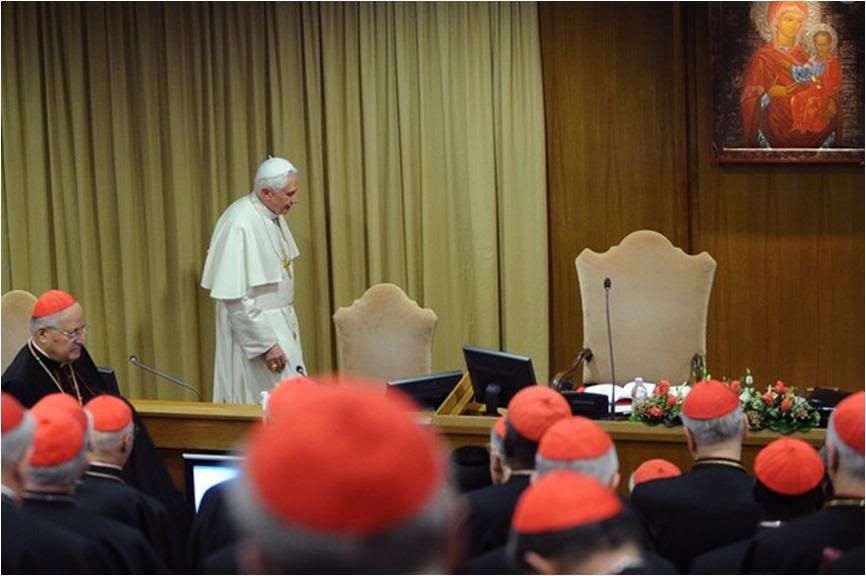
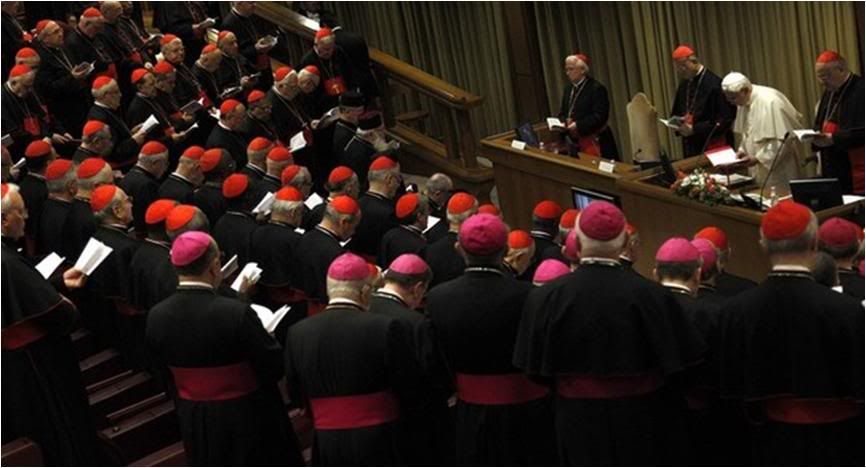
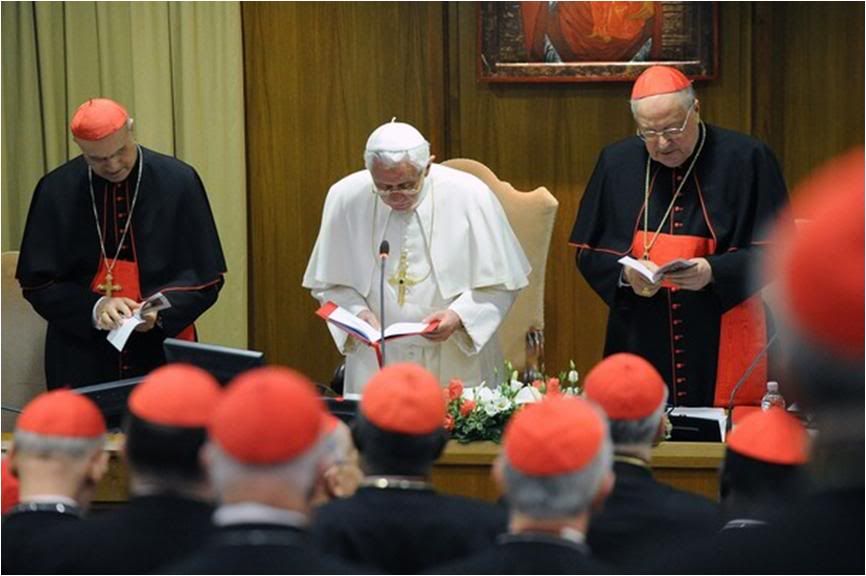
1. The day of prayer and study with the College of Cardinals convoked by the Holy Father Benedict XVI on the occasion of creating 24 new cardinals, began this morning, Friday, Nov. 19.
2. At the start of the meeting, which took place in the New Synod Hall, Cardinal Angelo Sodano, dean of cardinals, delivered a greeting to the Pope in the name of everyone present, thanking him for the recent beatification of Cardinal John Henry Newman and for initiating the process of beatification for Cardinal Nguyen Van Thuan, glory of the Vietnamese Church.
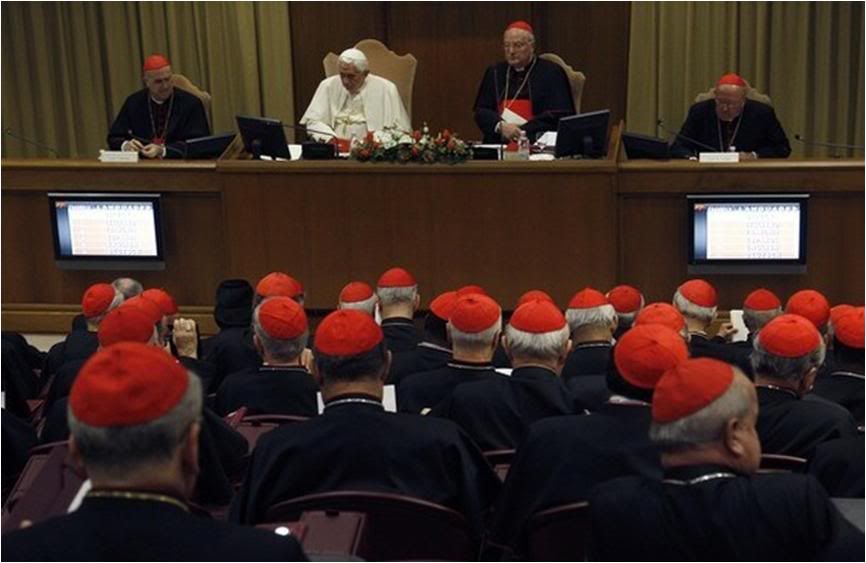
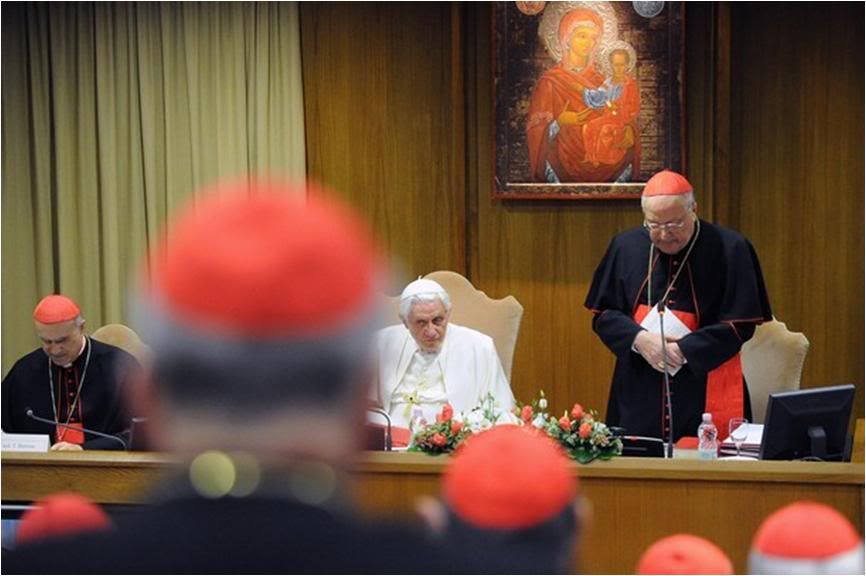
3. The Holy Father then took the floor and introduced the two subjects for the morning discussion. As to the first, he recalled that in the Lord's mandate to announce his Gospel, the exigency of freedom to do so was implicit, but throughout history, it has encountered diverse opposition.
The relationship between truth and freedom is essential, he said, but today, it faces a great challenge from relativism, which only seems to advocate the concept of freedom but in fact, risks destroying it in seeking to impose its 'dictatorship'.
Thus, he said, we find ourselves in a time of difficult commitment to affirm the freedom to announce the truth of the Gospel and the great acquisitions of Christian culture.
As for the second topic, the Pope recalled the essential importance of liturgy in the life of the Church, because it is the place of God's presence among us, and therefore, the place where Truth lives with us.
4. The morning session then discussed the two topics: freedom of the Church today, introduced by Cardinal Tarcisio Bertone, Secretary of State; and liturgy in the life of the Church, introduced by Cardinal Antonio Cañizares Llovera, Prefect of the Congregation for Divine Worship.
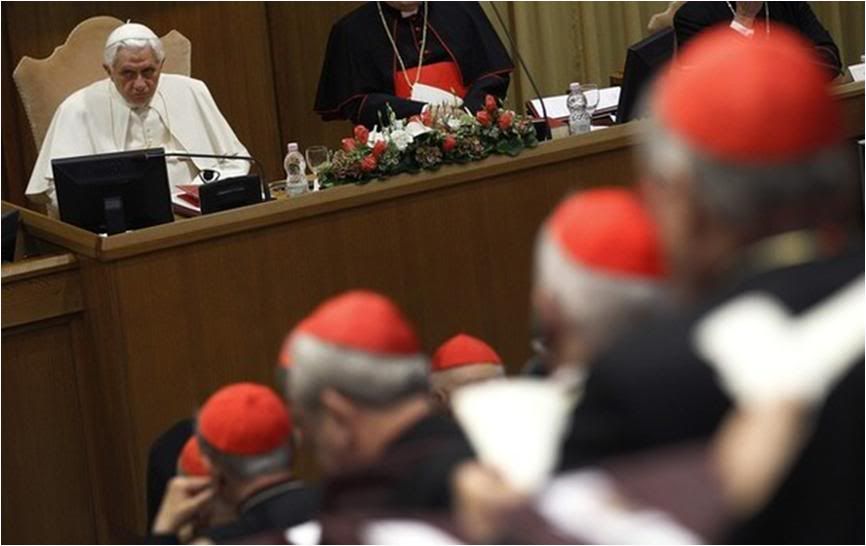
5. Cardinal Bertone presented a panoramic overview of the attempts these days to limit the freedom of Christians in various parts of the world.
First, he called for considering the situation of religious freedom in the countries of the West. Although these are nations which generally owe to Christianity the profound features of their identity and culture, today they are in a process of secularization with attempts to marginalize the spiritual values of social life.
Second, the Secretary of State discussed the situation of religious freedom in the Islamic countries, recalling the conclusions drawn by the recent Special Synodal Assembly on the Middle East.
Finally, he discussed the activities of the Holy See and local bishops in defense of Catholics in the West as in the East. He also referred to the Holy See's commitments in the international field to promote respect for religious freedom both with individual states as well as with the United Nations.
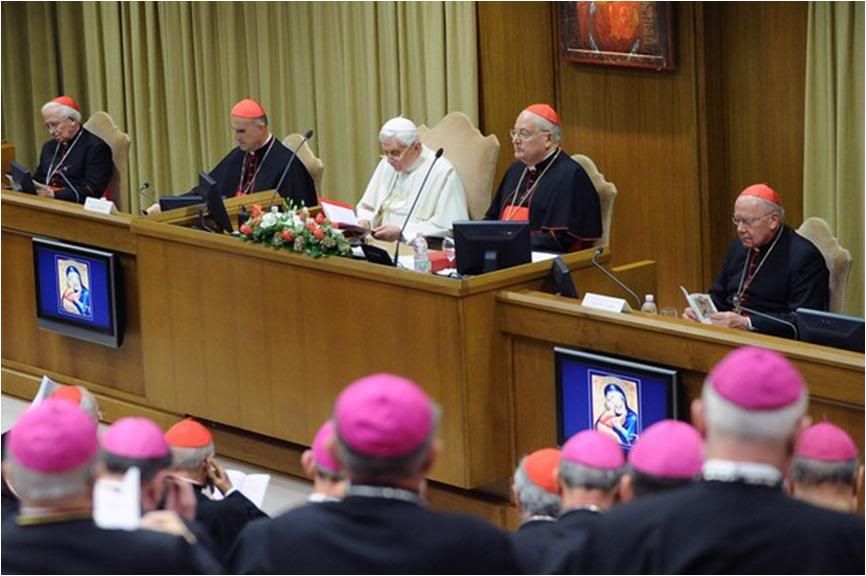
6. Cardinal Antonio Cañizares Llovera spoke on the importance of liturgical prayer in the life of the Church, referring to the teachings of the Second Vatican Council and the Magisterium of Benedict XVI. In particular, he emphasized the importance of faithfulness to prescribed liturgical discipline.
7. During the discussions that followed the presentations, 18 cardinals spoke to consider more deeply the problem of religious freedom and the difficulties encountered by the Church in various parts of the world. Specific situations were discussed in Europe, the Americas, Africa, Asia, the Middle East and the Islamic countries.
The cardinals also cited the serious difficulties encountered by the Church in the defense of values based on natural law, especially respect for life and for the family.
Also discussed was the state of inter-religious dialog, especially with Islam. Suggestions were made for concrete commitments to meet challenges in this area.
The discussions on the liturgy dwelt on the centrality of the Eucharistic celebration in the life of the Church, and on the respect demanded by the Sacrament of the Eucharist.
Further discussions were expected in the afternoon session.
8. At 1 p.m., the Holy Father hosted luncheon for the cardinals.
9. Two reports are expected in the afternoon session. The first, by William Cardinal Levada, is on the norms adopted by the Holy See for accepting Anglican clergy and faithful into the Catholic Church, and in behalf of minors who have been victims of sexual abuse by members of the clergy.
The second presentation was to be by Archbishop Angelo Amato, on the relevance today of the Instruction Dominus Iesus on Jesus Christ as the one Savior, ten years since it was promulgated.
10. Besides the present cardinals, also in attendance were the 24 prelates who will formally be named cardinal tomorrow. A total of about 150 cardinals were present. Many had requested the Holy Father to excuse them for their absence due to health reasons or because of urgent pastoral commitments in their respective dioceses.
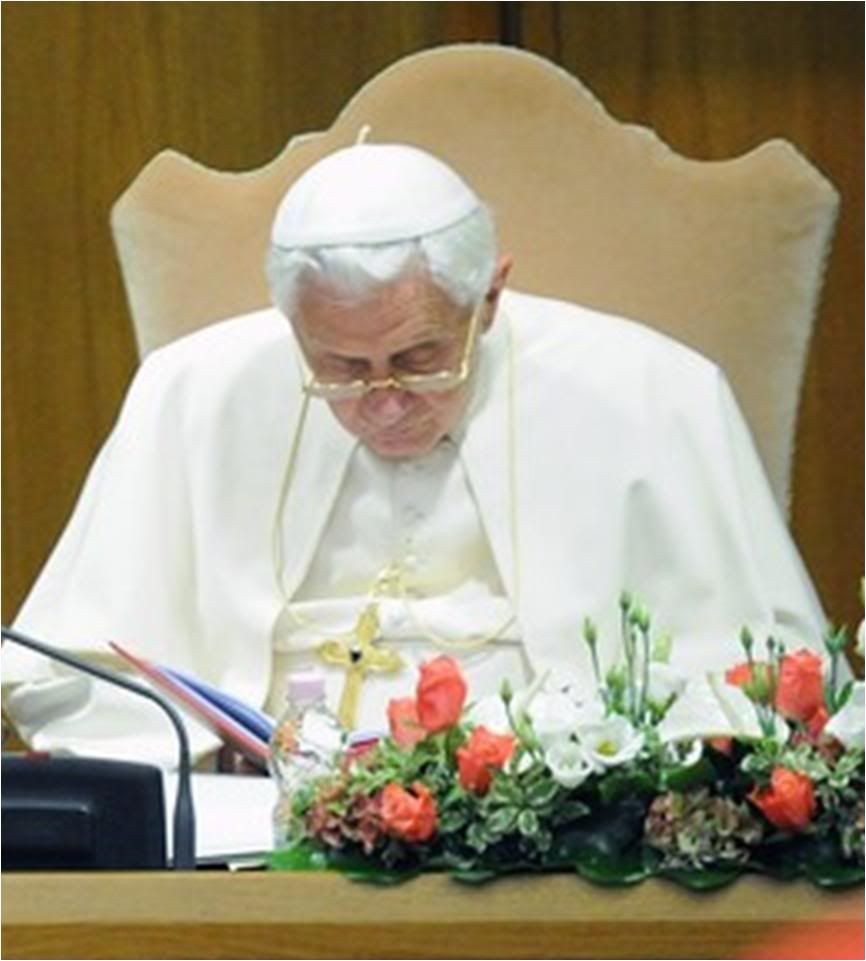
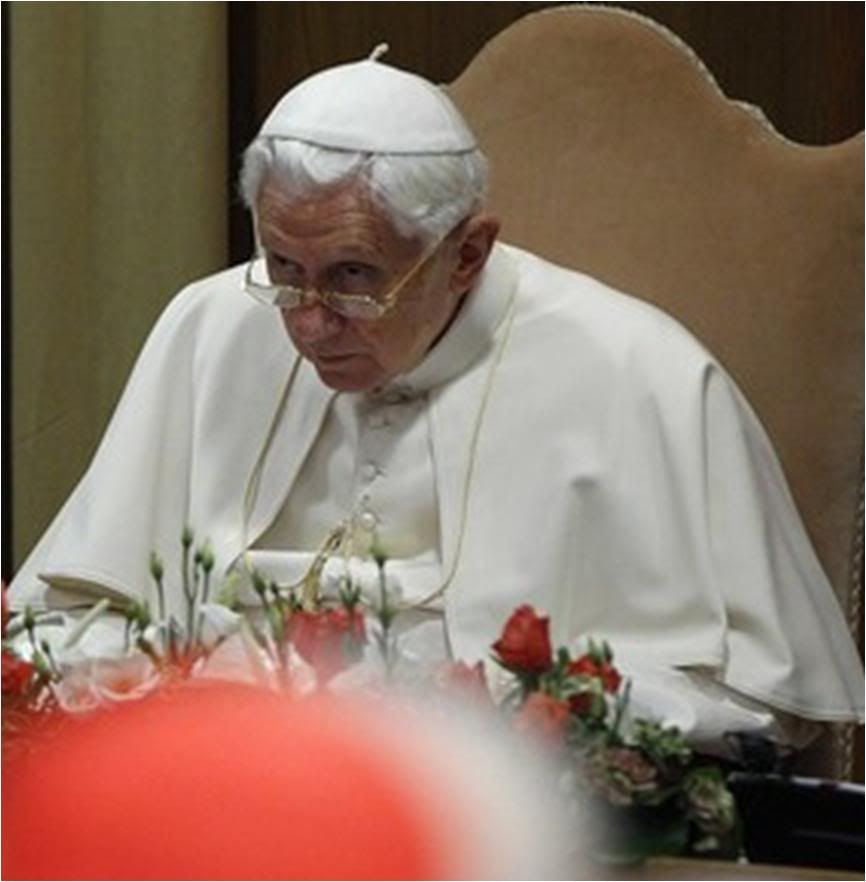 The Pope leaves Aula Paolo VI after lunch with the cardinals
The Pope leaves Aula Paolo VI after lunch with the cardinals:
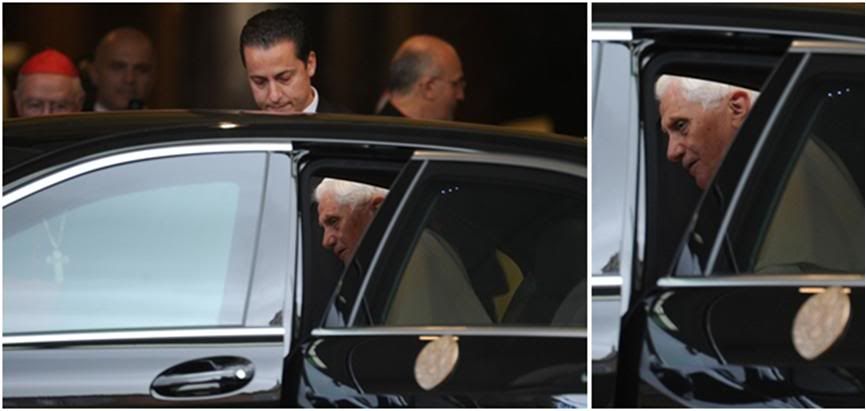 Collegiality in the Church:
Collegiality in the Church:
The Pope and the cardinals

Nov. 19, 2010
The appointment of new cardinals is always awaited with intense curiosity not only in the Church, but also by outside observers. As soon as the Pope announced the names of new cardinals a series of comments of the most varied perspectives began, statistical observations, calculations of the relative weights of nationalities, continents, and so on.
Of course in his nominations the Pope takes many different criteria into account, first among which are certainly duties in the service of Church and the universality of representation.
In this way the Pope forms a group of prominent personalities, who are entrusted with the crucial task of the election of the Successor of Peter, but who must also cooperate and support the Pope in his ministry with full spiritual solidarity.
The day of prayer and reflection that begins the November consistory, despite its inevitable brevity, reveals two important aspects of the function and the spirit in which the College of Cardinals operates and that should not be forgotten: prayer and reflection.
The Pope wants to pray with those who give the closest support to his service and wants to participate in their joint reflection. We can also observe that he wants to share a meal with them, which is perhaps of secondary importance, but not meaningless.
It is a community that meets, sharing responsibilities and concerns over the main problems that the Church faces in the world.
Benedict XVI follows and listens to every contribution with great attention, as he did in the weeks of the Synod of Bishops, as he does in the frequent ad Limina visits by group of Bishops from all parts of the world (at least 20 different groups in one year) in countless audiences and private encounters. His service is deeply embedded in the experience of the world’s episcopate.
Now, the days of the Consistory highlight another dimension of the "collegiality" of his style of government of the Church. We all accompany him with attention and prayer.
Communique on the afternoon session
Translated from

Nov, 19, 2010
The afternoon session started at 5 p.m.. with Vespers, followed by the three presentations on the program.
First, Archbishop Angelo Amato spoke on the Declaration Dominus Iesus from the Congregation for the Doctrine of the Faith 10 years since its publication. He noted that it clarified some fundamental Christological and ecclesiological truths, that relaunched ecumenical and inter-religious dialog on the basis of a precise Catholic identity.
At the same time, he said, it did not close the way to positive research as indicated by the (Second Vatican) Council on the great question of the salvation of Christians.
Finally, he noted that Dominus Iesus, warning against misguided pluralism, continues to be a valid reminder of doctrinal and pastoral clarity that provides a basis for catecheses, for the new evangelization and for the missio ad gentes.
Cardinal William Levada then presented the two reports entrusted to him: on the "Response of the Church to cases of sexual abuse: Towards a common orientation" and on "The Apostolic Constitution Anglicanorum coetibus".
In the first, the Cardinal gave an update on the current canonical legislations pertaining to the crime of sexual abuse of minors, and cited some observations regarding the wider responsibility of bishops for the care of the faithful entrusted to them - inspired, he said, by the words of the Holy Father and by his example of listening to the victims and receiving them.
He spoke of collaborating with civilian authorities and the need for effective commitment in protecting children and young people in their care, as well as careful selection and formation of future priests and religious.
Finally, he informed the assembly that the Congregation was preparing a circular Letter to the various bishops' conferences on guidelines for a coordinated and effective program following the abovementioned indications.
In the second report, Cardinal Levada explained the nature and origin of the Apostolic Constitution on the institution of Ordinariates for Anglican faithful who desire to enter 'corporatively' into full Communion with the Catholic Church.
He explained the ecumenical context and the present status of the constitution of these ordinariates, the first of which will be set up in Great Britain, as explained by the statement issued earlier today by the Bishops' Conference of England and Wales.
In the ensuing discussions, 12 cardinals intervened (bringing the total interventions to 30). Some of them spoke about the topics considered in the morning session - religious freedom and liturgy - while the rest dwelt on the Church response to the problem of sexual abuse by the clergy.
Among others, it was suggested that the bishops' conferences be encouraged to develop plans that are effective, timely, detailed, complete and decisive, for the protection of minors, with due consideration of the multiple aspects of the problem, and to establish the necessary lines of intervention to bring justice, assistance to victims, and for the proper the formation of priests - even in the countries where the problem has not been manifested as obviously and as tragically as in others.
It was also decided to express the solidarity of the College of Cardinals, joining the Holy Father, with the peoples of Iraq and Haiti who have been particularly tried by recent events, and to raise funds in their respective dioceses to be sent through the Pontifical Council Cor Unum as charitable assistance.
The session ended shortly atfer 7 p.m., with brief remarks of thanks from the Holy Fahter, and the recitation of the Angelus.
[Modificato da TERESA BENEDETTA 20/11/2010 11:26] |